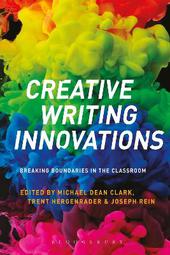
|
Creative Writing Innovations: Breaking Boundaries in the Classroom
Hardback
Main Details
| Title |
Creative Writing Innovations: Breaking Boundaries in the Classroom
|
| Authors and Contributors |
Edited by Dr Michael Dean Clark
|
|
Edited by Dr Trent Hergenrader
|
|
Edited by Joseph Rein
|
| Physical Properties |
| Format:Hardback | | Pages:256 | | Dimensions(mm): Height 234,Width 156 |
|
| ISBN/Barcode |
9781474297172
|
| Classifications | Dewey:808.02071 |
|---|
| Audience | | Tertiary Education (US: College) | | Professional & Vocational | |
|---|
| Illustrations |
1 b/w illustration
|
|
Publishing Details |
| Publisher |
Bloomsbury Publishing PLC
|
| Imprint |
Bloomsbury Academic
|
| Publication Date |
23 February 2017 |
| Publication Country |
United Kingdom
|
Description
When teachers experiment, students benefit. When students gain confidence to pursue their own literary experiments, creative writing can become a life-changing experience. With chapters written by experienced teachers and classroom innovators, Creative Writing Innovations builds on these principles to uncover the true potential of the creative writing classroom. Rooted in classroom experience, this book takes teaching beyond the traditional workshop model to explore topics such as multi-media genres, collaborative writing and field-based work, as well as issues of identity. Taken together, this is an essential guide for teachers of creative writing at all levels from the authors and editors of Creative Writing in the Digital Age.
Author Biography
Michael Dean Clark is Associate Professor of Writing at Azusa Pacific University, USA. Formerly an award-winning journalist, his fiction and non-fiction work has appeared in Pleiades, Fast Forward, Relief, and a number of other periodicals. Trent Hergenrader is an Assistant Professor at the Rochester Institute of Technology, USA. He is a co-founder of the Creative Writing Studies Organization and the Journal of Creative Writing Studies and the author of Collaborative Worldbuilding for Writers and Gamers. Joseph Rein is Assistant Professor of Creative Writing at the University of Wisconsin, River Falls, USA. He is the editor of Dispatches from the Classroom and his fiction, poetry and essays have appeared in such publications as The Pinch Literary Magazine, Iron Horse Literary Review, and Ruminate Magazine. He is also an award-winning short-film screenwriter.
ReviewsWritten by practitioners for practitioners whose hackles might still raise at the suggestion that theirs is a soft option, there is a sense of community in these pages which speak to those already working in the field and so do not waste time explaining, but move swiftly to examine the subject's dynamics and potential. It aims to challenge practitioners in order to provoke newer forms and studies in this field ... Does the book achieve what it sets out to do? Certainly. It points towards the 'vast possibilities of our field' and it offers discussion, debate and practical resources and it provokes newer enquiries ... Our students need to be in safe hands for the exciting journeys they embark on, and this book is a strong map for those of us who direct and point out the possible routes. * New Writing * Clark (Azusa Pacific Univ.), Hergenrader (Rochester Institute of Technology), and Rein (Univ. of Wisconsin, River Falls) have produced a compelling follow-up to their edited collection Creative Writing in the Digital Age (2015). This new offering assembles 16 essays with the shared goal of rethinking and restructuring university-level creative writing curricula. The essays are organized in four sections-'Rethinking the Workshop,' 'Expanding Genre,' 'Creative Collaborations,' and 'Identity and the Creative Writing Classroom'-and many of the contributors express dissatisfaction with the hallmark of creative writing instruction in the US: the creative writing workshop. For example, in his manifesto 'The Unworkshop,' Graeme Harper radically revises the workshop method by prioritizing intellectual curiosity and student autonomy above expectations for traditional academic coursework. By contrast, Derek Harriell proposes a sequenced graduate writing workshop that improves rather than dismantles the traditional workshop. Another remarkable essay, Ching-In Chen's 'Gender Identity and the Creative Writing Classroom,' articulates an approach to creative writing pedagogy that values and affirms the work of genderqueer and nonbinary writers. Taken together, the essays in this collection expand the emergent field of creative writing studies and provide thoughtful, replicable strategies for guiding and supporting student writers. Summing Up: Highly recommended. * CHOICE * Essential reading for undergraduate and graduate-level creative writers who teach ... [It] advance[s] the rigor of creative writing as an academic discipline with deep ties to the sister world of composition and rhetoric while nudging teacher-writers toward innovative, process-oriented pedagogies and heuristics. * Journal of Teaching Writing *
|